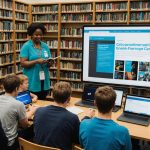Technology Integration in Remote Learning
In the evolving landscape of education, technology integration has become crucial for facilitating effective remote learning. Vital to this integration are the online learning tools that empower institutions to deliver education beyond traditional boundaries. Tools like Google Classroom, Zoom, and Microsoft Teams provide platforms for organizing coursework, enabling real-time interaction, and managing assignments, thus making digital education more structured and interactive.
Successful case studies from UK universities highlight the transformative potential of digital platforms. For instance, the University of Edinburgh effectively used MOOC (Massive Open Online Courses) platforms to reach a global audience, enhancing the student experience by offering accessibility and diverse learning materials. Similarly, the University of Manchester integrated digital platforms like Blackboard to enable a seamless transition from in-person to online classes, ensuring continuity in education during disruptions.
Also read : Transforming university administration: proven ai strategies for uk institutions to optimize operations
Emerging trends in educational technology, like artificial intelligence-driven personalized learning systems, are set to further revolutionize the landscape. These technologies promise to tailor content to individual learning styles, making education more engaging and efficient. As these trends develop, the emphasis will increasingly be on enhancing the student experience and ensuring that education is both inclusive and flexible, adapting to the varied needs of learners in a digital-first world.
Engaging Remote Learners
To effectively enhance student engagement in online classes, it is crucial to implement interactive learning techniques. One successful method involves integrating virtual breakout rooms during sessions, encouraging collaboration and fostering participation among students. This approach simulates an in-person group setting, allowing learners to engage in discussions and problem-solving activities.
Also read : Unlock efficiency: automate your collection processes now
Maintaining student motivation is another significant challenge in remote learning environments. Teachers can implement educational strategies such as setting achievable goals and providing frequent feedback. Celebrating small achievements not only motivates students but also makes learning more enjoyable for them.
Incorporating gamification within the curriculum can further boost student involvement. By turning lessons into competitive games or quizzes, students are more likely to remain attentive and enthusiastic. For instance, using platforms like Kahoot or Quizizz, educators can create fun quizzes that challenge students on the subject matter.
Active learning strategies are also effective in keeping students focused. This could include interactive polls, problem-based learning tasks, or even virtual simulations that relate to the course content. By maintaining a dynamic and interactive learning atmosphere, educators can significantly enhance student engagement in a remote setting.
Assessment Methods for Remote Learning
When transitioning to remote learning, selecting effective assessment strategies is crucial. Online evaluations should reflect best practices to maintain academic standards and ensure students’ learning is accurately gauged.
Online evaluations have evolved with technology, providing various platforms that cater to different learning needs. Tools like quizzes, essays, and interactive assignments allow for diverse formats, catering to varied learning styles. Leveraging technologies such as Learning Management Systems (LMS) not only facilitates the delivery of assessments but also aids in providing streamlined feedback.
Academic integrity remains a fundamental concern in online assessments. Proctors and plagiarism-detection software like Turnitin or ProctorU help in minimising dishonest practices. These technologies promote a fair evaluation environment and encourage genuine effort from students.
Challenges in maintaining academic integrity can be extensive. Institutions must develop robust systems and clear guidelines to uphold these standards. Including honour codes and explaining the importance of ethics encourages students to maintain honesty.
In remote settings, offering timely and constructive feedback plays a significant role in student improvement. Utilizing automated feedback tools and peer-review systems can speed up the grading process. These methods ensure that feedback is not only efficient but also meaningful, positively influencing the learning journey.
Support Services for Remote Students
For remote students, student support encompasses a range of critical services that cater to their unique needs. Academic assistance is pivotal, offering tools like online tutoring and virtual study groups. These resources ensure that students can engage with coursework efficiently, regardless of their geographical location.
Mental health resources are equally essential, particularly as remote study can lead to feelings of isolation. Universities are pioneering innovative approaches to address this. Virtual counselling sessions and wellness workshops provide students with necessary outlets to discuss and manage their mental health. Access to mindfulness and stress-relief applications is also a popular strategy, promoting overall well-being.
A significant aspect of supporting remote learners involves the collaboration between departments. Academic, IT, and counselling teams are working together to build a robust support structure. This collaboration ensures students receive a cohesive experience, with each department contributing to improving accessibility and engagement.
In essence, universities understand the challenges faced by remote students and are committed to devising solutions that make academic and personal success achievable for everyone involved. The seamless integration of resources is key to nurturing a supportive educational environment.
Enhancing Overall Student Experience
Understanding the driving factors behind student satisfaction in remote learning is essential for universities. Effective strategies often involve regular feedback mechanisms to gauge satisfaction and areas for improvement. Implementing adaptive learning technologies can personalise the education experience, catering to individual student needs and thereby enhancing satisfaction.
Universities are increasingly adopting initiatives that focus on improving learning outcomes in digital settings. Blended learning models that integrate both online and face-to-face interactions have shown positive results. This approach ensures students can grasp complex concepts while benefiting from digital resources.
A prominent aspect of increasing student satisfaction is creating a sense of community in remote environments. Institutions focus on fostering connections through virtual platforms. For example, digital workshops and peer interaction tools help maintain engagement and community spirit. The University of London has successfully implemented social media groups and online clubs, where students can share experiences and study collaboratively.
In a drive to support student-centred learning, universities worldwide are placing emphasis on university initiatives that facilitate networking among remote learners. These programs encourage active participation, allowing students to feel part of a larger educational community. Consequently, student satisfaction and positive learning outcomes become intertwined, offering a more rewarding university experience amidst remote learning challenges.











